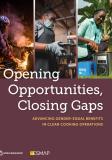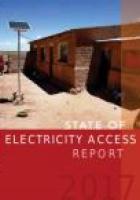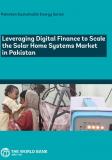Publications
The State of Electricity Access Report, 2017, aims to prompt governments, donors, the private sector, civil society organizations, and practitioners to develop interventions to close the electricity access gap by integrating lessons learned with insights drawn from emerging innovative business and delivery models.
The Report is organized around five main questions: Why is electricity access critical for achieving the 2030 Agenda for Sustainable Development? What is the status of electricity access? What are the challenges and drivers of transformative electricity access? Why is it important to explore synergies between access, renewables, and energy efficiency? What are the emerging and innovative business and delivery models?
The key findings are that urgent measures are needed to speed up access to modern energy services or there will still be several countries in 2030, mostly in Sub-Saharan Africa, with a significant percentage of the population going without electricity. Both grid and off-grid approaches will be critical, but they will have to be supported by a conducive enabling environment of the right institutions, policies, strategic planning, regulations, and incentives.
The good news is that lower costs for renewable energy technologies, adequate energy efficiency measures, and innovation should make it possible for countries to be creative in meeting this challenge. There is also a growing role for the private sector to finance interventions, assuming the incentives are in place for investors to earn returns on their investments.
Download special feature reports
Learn more about the ESMAP Energy Access program
World Bank. 2017. State of Electricity Access Report 2017. World Bank, Washington, DC. © World Bank. License: CC BY 3.0 IGO. https://openknowledge.worldbank.org/handle/10986/26646


